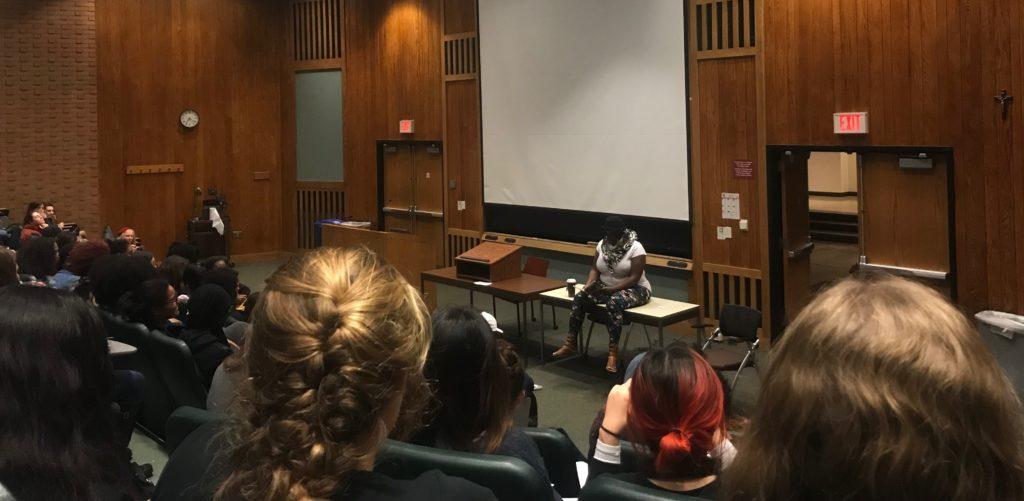Sonya Renee Taylor approached the podium with a booming confidence that matched her booming voice. Turning off the microphone provided for her, she addressed her audience, which was comprised mostly of women, as one would address a friend. Dressed in patterned leggings and a billowing scarf, Taylor took a seat on a table, solidifying the easygoing nature of her lecture, or rather the conversation, on her new book titled The Body Is Not an Apology: The Power of Radical Self-Love.
The Boston College Women’s and Gender Studies Program welcomed Taylor to speak to students for the second year in a row this past Tuesday. After publishing two books within the year, including The Body is Not an Apology, and moving to New Zealand, Taylor spoke to students about her book and, in her own words, give them “a space to unpack their ideas.”
Charlene Hesse-Biber, co-director of the program, decided to reinvite Taylor to speak at BC because her first appearance was so successful.
“Sonya came last year, and she was a great hit,” Hesse-Biber said. “People really got a lot out of her talk. … She digs down into her own issues and her own positionality and provides a way forward that gets at transformation not as a big bang, but as something you can do to change the world starting with yourself.”
Taylor began her discussion in her “native tongue,” as she does each time she addresses a crowd: with a spoken word poem. With a riotous call-and-response, Taylor engaged her audience and introduced the ideas behind her novel.
In essence, Taylor encourages “radical self-love,” rather than self-acceptance. This, she said, is the root of transformative love that ripples off into the world, causing change in American social systems. Though her novel looks like one on body positivity, it is anything but—specifically in the commercial sense. Taylor does not claim that her novel will improve readers’ self-confidence or self-esteem, in fact she dismisses this notion in the first chapter. Rather, she acknowledges the intersectionality of body positivity and social change.
“It’s a radical self-examination of how you love as an action rather than as a noun,” Hesse-Biber said of Taylor’s book.
After introducing the roots of her book, Taylor opened the conversation to the audience, encouraging vulnerability in questions. Students came forward, telling stories of their own tribulations woven into the ideas of Taylor’s book. Her responses, emphatic and roaring, were met with snap-claps and cheers of agreement.
At the end of the seminar, Taylor gave her audience an assignment: Notice the amount of rape culture comments, body shaming, and body terrorism that goes unaddressed on campus. Then, step into power and do something about it.
Featured Image by Isabella Cavazzoni / Heights Staff













